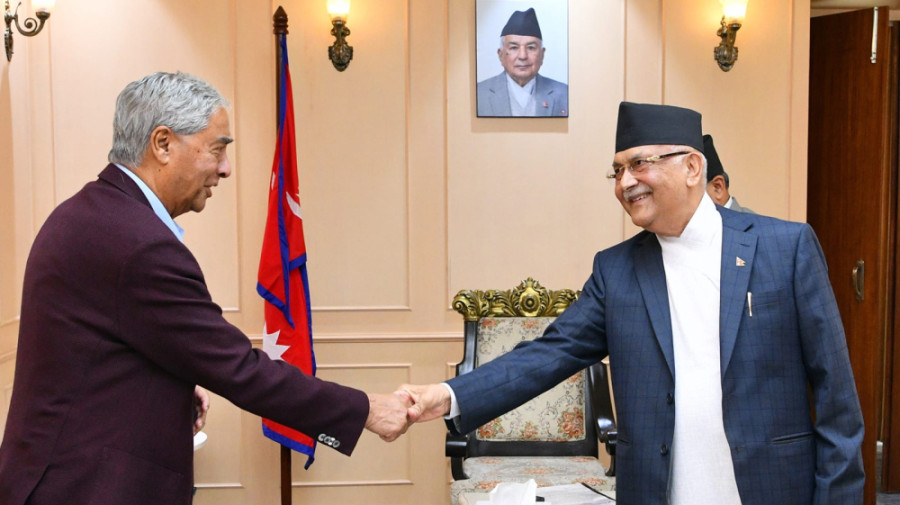Tue, Mar 3, 2026
Editorial
Alliance without action
A year into office, the coalition is increasingly losing relevance by failing to deliver on its promises.
bookmark
Published at : July 30, 2025
Updated at : July 31, 2025 06:58
The Congress-UML coalition, which has completed a year in office, has failed to deliver on one after another promise it made during the formation of the KP Sharma Oli-led government in July last year. The two parties joined hands based on a seven-point agreement that outlined the major objectives of the to-be-formed government. In the agreement, they pledged to control corruption, improve governance, accelerate development activities, and ensure political stability. They also promised to focus on amending the constitution and enacting related laws in order to ensure political stability. On the economic front, the coalition vowed to end the prolonged economic slowdown, create a reliable business environment, and boost economic activities.
The alliance of the two largest parties made a lofty promise of amending the constitution to lay the ground for political stability. But, in reality, it has failed even to amend laws for day-to-day governance. The two parties, which announced plans to expand the Oli government into a national consensus coalition, failed to win the confidence of even the Rastriya Janata Party-Nepal (RJP-Nepal), which had given the trust vote to Oli. The party recently withdrew its support to the government accusing Oli of trying to formulate laws by adding dubious provisions in land-related laws.
Failing to retain Upendra Yadav’s RJP-Nepal in the coalition has serious consequences. The coalition, which has an overwhelming majority in the House of Representatives, is in minority in the National Assembly without the party’s support. Again, the government’s failure to endorse the land-related ordinance is an example of its short-sightedness. It brought the land bill through Parliament, in the process further annoying JSP-Nepal. Also, alarmed by some provisions in the bill, even some lawmakers and senior leaders of the Congress such as general secretary Bishwa Prakash Sharma have registered amendment proposals to the bill.
A number of decisions made by this government make a mockery of Oli’s commitment to good governance. Prime Minister Oli and Energy Minister Deepak Khadka have been continuously protecting the industrialists who have defaulted on years-old electricity bills worth billions of rupees, suggesting the government’s pledge on good governance is nothing more than lip service. Reports claiming that many ministers in the Oli Cabinet are neck-deep in corruption are hard to deny either. While then minister Raj Kumar Gupta resigned earlier this month over bribery charges, another minister Balaram Adhikari is still holding the position despite being accused in the same case.
Separately, the latest case of intra-party feud in the Congress in Bagmati province has sparked concern of instability in the provincial government. Many fear the dispute may push Bagmati into a condition similar to that of Koshi two years ago when the province saw the making and breaking of multiple governments. In Bagmati, a majority of lawmakers passed a no-confidence motion in the party committee against incumbent Chief Minister Bahadur Singh Lama. However, he is resorting to every tactic in the book to cling in power. Lawmakers Maya Shrestha and Mina Parajuli on Tuesday mysteriously changed their anti-Lama stand and came around to supporting him. As if on cue, Lama appointed three new ministers, including Shrestha, on Wednesday.
To justify the need for two largest parties to join hands to form a coalition government, Congress and UML leaders last year argued that the country was in an extraordinary situation that called for extraordinary measures to ensure stability and economic revival. But a year into office, the coalition is increasingly losing its relevance by failing to deliver on the promises it made. Signs of in-party discords like the most recent one in Bagmati province will only add to its dysfunction.
Most Read from Editorial
Editor's Picks
Five and half decades of KP Oli in Nepali politics
How Facebook’s algorithm is amplifying one party over all others
Nepal’s IT exports near $1 billion. Can the momentum be sustained?
Parties’ lofty pledges on economy collide with hard realities
Upper house passes tourism bill with tougher Everest rules
E-PAPER | March 03, 2026
×




 9.89°C Kathmandu
9.89°C Kathmandu














